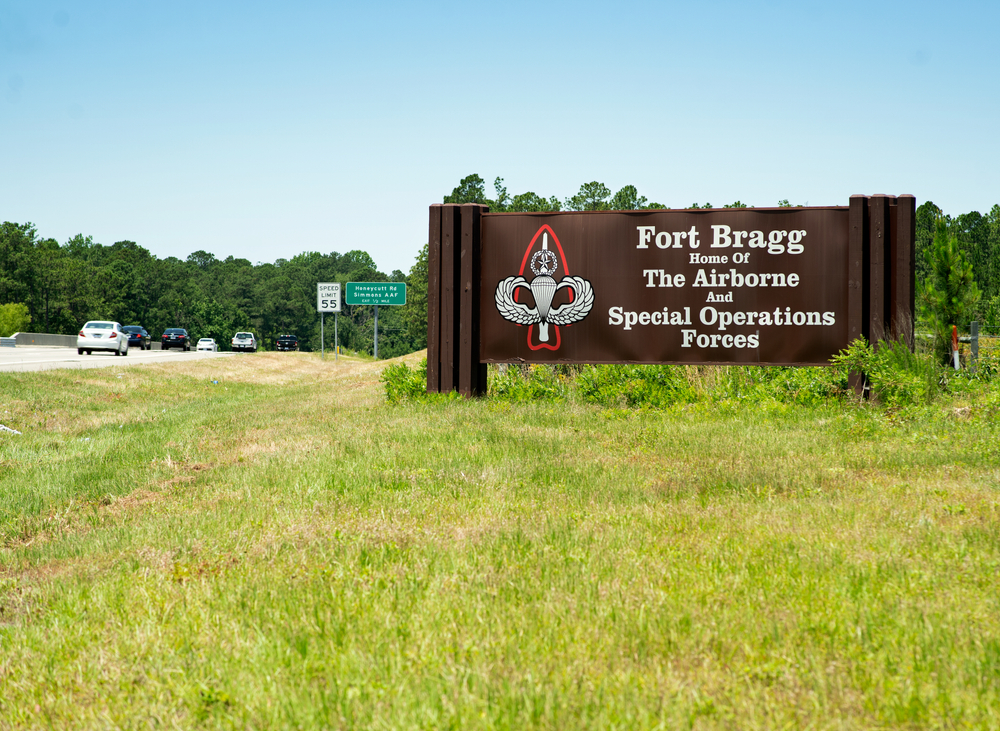Early in January, the U.S. Department of Defense began a massive undertaking to change the names of nine military bases, two ships, and over 1,000 other items, including signs and roads, all of which are currently linked to Confederate figures. Fort Bragg, Fort Benning, the USS Chancellorsville, and a host of other military properties will undergo the purge, estimated to cost $62.5 million.
Some might view this initiative as caving to societal pressure to blot out all reminders of historic racism from our national field of vision. That seems likely to be the case, whether you view it as laudatory or not. It’s worth remembering that legislation paving the way for this project was included in the National Defense Authorization Act of December 2020, which passed with “overwhelming bipartisan support” and an override of President Trump’s veto. But there has certainly been popular pushback on the project from sources like this one, claiming that “it reflects poorly on our society that some people cannot accept and learn from controversial history” and “common sense suggests that this kind of money should be used for something more productive.”
I think it’s worth evaluating those claims with a little more nuance than Next News provides. There’s both an economic and a moral-cultural question at play here, and we should give them each their due consideration.
From an economic angle, while only a small portion of the vast U.S. military budget, $62.5 million is still a massive amount of taxpayer money. And yes, that money could be used for something else. The question of whether other uses by the federal government would be more “productive,” however, may not have a universal, commonsense answer.
On the surface, renaming a bunch of buildings, vessels, and roads makes close to zero difference to most of the people inhabiting, sailing in, or driving on them. I have a couple of friends who have been stationed at Fort Bragg and Fort Benning, and I doubt they would say that their day-to-day operations would be affected in the least if the base names were changed to Fort Liberty and Fort Moore. If human beings lived and acted solely within an economic framework, this decision still makes very little sense, as it’s hard to see what substantial goods or services would be provided to the consumers of these military institutions in exchange for the exorbitant cost of production.
What people spend money on, however, shows what they value, and there’s no exception here. Clearly the DoD (or at least the Congress-appointed Naming Commission that recommended the changes) sees enough value in this project to spend tens of millions of dollars on it. Katherine Kuzminski, senior fellow at the military-research think tank Center for a New American Security, gave a clue to the subjective value of the project when she said, “What the Naming Commission was doing … was changing the culture.” Congress recognizes that: Whether or not the soldiers themselves see any substantial profit from all the funds going into the name changes, the payoff in cultural modification is, apparently, worth the economic investment.
But will the expected cultural change actually occur? At this point, I am reminded of lines from the second-to-last stanza of the poem Mythopoeia by J.R.R. Tolkien:
I will not walk with your progressive apes,
erect and sapient. Before them gapes
the dark abyss to which their progress tends —
if by God’s mercy progress ever ends,
and does not ceaselessly revolve the same
unfruitful course with changing of a name.
The phrasing of the last three lines makes one wonder: Does changing the name of a place have an effect on its underlying reality?
In the Scriptures, we see instances where God changes a person’s name to indicate a new role he is giving them or an affirmation of a future reality. Examples include God changing the name of Abram (“high father”) to Abraham (“father of many”) as part of the covenant promise, or Christ changing the name of Simon (“God has heard”) to Peter (“rock”) to establish Peter’s primacy among the apostles. Legally, people change their names when they are adopted or get married. With regard to people, changing a name typically indicates either a past or a future change to that person’s identity.
Surely with military outposts this is not the case. Fort Bragg will still cover 251 square miles of North Carolina turf and house 54,000 military personnel, even if you call it Fort Liberty. It will retain the same purpose. The effect of the change is not on the place itself but on the perception of it. The change is in us, the culture-creators and culture-recipients. When we consider this massive initiative our nation is about to assume, we acknowledge that who or what is being honored—and dishonored—is intended to send a very real cultural message, one whose perceived significance is apparently worth $62.5 million.
How much would you pay to end racism in America? Such questions boil down to putting a price tag on human dignity, to bargaining with incommensurate realities. The value of the human person is infinite, but in the practical workings of government, everything costs something. The answer to this question is not a dollar amount, but that’s how the DoD is trying to answer it.
Even asking this question, however, assumes that renaming military property will contribute to ending racism in America, which to me seems a shaky assumption at best. I think racism is better combatted through vibrant local communities where people of all races and backgrounds can share their diverse experiences, through strong families who teach their children to value and respect every human person, and through thick cultures embracing and passing on their traditions. And those things are fostered not through top-down legislation but through the principle of subsidiarity.
I think that principle can apply here, too. Rather than seeing the government as a God-like entity trying to alter an entire nation’s future by pursuing an “unfruitful course with changing of a name,” I suggest we look at a biblical analogy that more accurately reflects the situation.
In both the Old and New Testaments, there are many examples of places or objects being named or renamed because of something significant having happened in relation to them. For instance, after Jacob wrestles with an angel (incidentally, immediately after he is renamed Israel), he calls the name of the wrestling turf Peniel (“face of God”) to commemorate his encounter there. Another instance is the naming of the place of Judas’ death Akeldama (“field of blood”) in the book of Acts.
These and countless other examples demonstrate a perfectly natural naming methodology. Indeed, it is in large part how the military bases were named after Confederate figures in the first place. Local military communities named local bases after the leaders they found inspiring, after those who influenced events and made history in their particular regions, and those names persisted as bases were consolidated and grew in size. Since this natural outgrowth of history and culture is what we have inherited, it seems acceptable to me (and much less expensive) that the United States leave the names as they are and let that heritage endure.
This does not equate to affirming slavery or proclaiming support of the Confederate side in the Civil War. People are capable of making mental distinctions, and naming a road after a local military officer no more affirms the morality of the causes he fought for than naming a field Akeldama affirms the morality of suicide. You can visit the memorial of Alexander the Great in Thessaloniki without condoning arranging your cousin’s execution or having a harem. You can walk down the Rue Robespierre outside of Paris without applauding the Reign of Terror. Rather, I think it equates to calling a street in the Catholic neighborhood of a big city after St. Joseph and leaving it that way even after non-Catholics come to predominate and the Catholic residents have stopped going to church.
It also does not equate to deciding in 2023 to name a hypothetical brand-new military base after a Confederate general. For one thing, after World War II, the process of naming new military outposts was standardized. For another, the same principle of respecting local historical significance applies with regard to which figures we choose to honor in our own day and age. National values can shift, as we’ve seen over the decades, and this is reflected in whom we choose to honor, and where, and when. We honor different types of figures now than in the Civil War era. But this does not mean we need to go back and change who and what was held in honor in the past. Better, and harder, to learn why such honor was bestowed in the first place.
Ultimately, subsidiarity provides a guide here because context matters. The military bases in the South were originally named for Confederate figures because they were great military strategists and leaders, admired for their courage and foresight, not merely the causes for which they fought. Those seem like important qualities for current military personnel to assimilate, and since the bases function within a military context, promoting those virtues through honoring historical instances of them seems appropriate.
It is true that other, less legitimate reasons than an admiration for military virtue may exist in the honoring of these figures. Racist attitudes still abound, but the solution to them is to be found in education and dialogue, not top-down federal spending or Stalin-esque erasure.
So is the economic cost worth the expected cultural payout? In my opinion, no. But there are many moving parts to this issue. Let’s not jump immediately from the DoD announcement to a dismissive “according to the left, white supremacy is our biggest threat in America.” Let’s have a more thoughtful, principles-based, constructive conversation.

